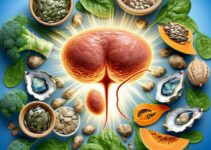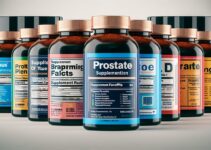As a man, you understand the importance of maintaining optimal prostate health. It's not something you think about every day, but it's always in the back of your mind. You may have heard about the potential benefits of certain vitamins for supporting prostate health, but do you know which ones are truly essential? Stay informed and take control of your well-being by discovering the 10 best vitamins that can contribute to your prostate health.
Key Takeaways
- Adequate levels of vitamin D, vitamin E, vitamin C, vitamin B6, and vitamin K2 are essential for maintaining optimal prostate health.
- Zinc and selenium play crucial roles in supporting prostate health and function.
- Lycopene, found in foods like tomatoes and watermelon, is a powerful antioxidant linked to prostate health and may prevent prostate cancer.
- Saw Palmetto and omega-3 fatty acids have beneficial effects on prostate health, reducing symptoms of BPH and reducing the risk of prostate cancer.
Vitamin D
To maintain optimal prostate health, it is important to ensure that you are getting an adequate amount of vitamin D through sunlight exposure, diet, or supplementation. Sunlight exposure is a natural way for your body to produce vitamin D. However, it is essential to strike a balance, as excessive exposure to sunlight increases the risk of skin cancer. Aim for 10-30 minutes of midday sunlight, at least twice a week, on the arms, legs, or back without sunscreen. It is important to note that sunscreen with an SPF of 30 or higher reduces vitamin D production in the skin.
In cases where sunlight exposure is insufficient, dietary sources of vitamin D should be emphasized. Fatty fish, such as salmon and tuna, are excellent dietary sources. In addition, fortified foods like milk and orange juice can contribute to your vitamin D intake. However, supplementation may be necessary, especially for individuals with limited sun exposure or specific medical conditions. When opting for supplementation, it is crucial to consider the recommended dosage and the efficiency of absorption, as these factors significantly impact the effectiveness of vitamin D in maintaining prostate health.
Vitamin E
Vitamin E plays a crucial role in supporting prostate health and function, as it acts as a powerful antioxidant that helps protect the prostate from oxidative stress and inflammation. Research suggests that adequate levels of Vitamin E may benefit prostate health by reducing the risk of prostate cancer and supporting overall prostate function. Studies have shown that Vitamin E, especially in combination with other antioxidants such as Vitamin C and selenium, may help in maintaining prostate health. Additionally, Vitamin E has been found to support prostate health by promoting normal cell growth and function in the prostate gland.
Furthermore, Vitamin E research has indicated that this essential nutrient may play a role in reducing prostate-specific antigen (PSA) levels, which can be an indicator of prostate health. However, it is important to consult with a healthcare professional before taking Vitamin E supplements, as high doses of this vitamin may have adverse effects. In conclusion, Vitamin E is an important nutrient for supporting optimal prostate health and function, and incorporating it into a well-balanced diet may contribute to maintaining prostate health.
Vitamin C
Research has shown that in addition to Vitamin E, Vitamin C also plays a crucial role in supporting prostate health and function, particularly due to its antioxidant properties and potential synergistic effects with other nutrients. When it comes to prostate health, Vitamin C benefits cannot be overlooked. Here's how Vitamin C impacts prostate health:
- Antioxidant Protection: Vitamin C acts as a powerful antioxidant, protecting prostate cells from oxidative damage, which may contribute to the development of prostate issues.
- Inflammation Reduction: Vitamin C has been found to help reduce inflammation in the prostate gland, potentially lowering the risk of prostate-related concerns.
- Tissue Repair and Maintenance: Vitamin C is essential for the repair and maintenance of prostate tissues, supporting overall prostate health and functioning.
- Immune System Support: Vitamin C is known for its role in supporting the immune system, which is crucial for addressing and preventing prostate health issues.
Ensuring an adequate intake of Vitamin C through a balanced diet or supplementation may positively impact prostate health and reduce the risk of prostate-related concerns.
Zinc
Zinc plays a crucial role in supporting prostate health and function by contributing to various physiological processes within the prostate gland. The prostate has one of the highest concentrations of zinc in the body, emphasizing its importance in maintaining prostate health. Zinc is involved in the production and secretion of prostatic fluid, which is essential for sperm health and fertility. Additionally, zinc is believed to play a role in regulating prostate cell growth and supporting the normal structure and function of the prostate.
Research suggests that zinc supplementation may offer several prostate health benefits. Some studies have shown that zinc levels in the prostate decrease with age and in certain prostate conditions, indicating a potential link between zinc deficiency and prostate health issues. Zinc supplementation has been associated with supporting healthy prostate size and function. Furthermore, it may also help maintain healthy testosterone levels, which is important for overall prostate health.
Selenium
Selenium plays a critical role in supporting prostate health by contributing to various physiological processes within the prostate gland. It is an essential trace mineral that acts as an antioxidant, helping to protect the prostate from oxidative stress and inflammation. Here are some key points to consider when it comes to selenium and prostate health:
- Selenium Supplementation: Research suggests that selenium supplementation may help reduce the risk of developing prostate cancer and can aid in the management of prostate conditions. However, it's important to consult with a healthcare professional before starting any new supplement regimen.
- Selenium-Rich Foods: Incorporating selenium-rich foods into your diet, such as Brazil nuts, sunflower seeds, fish, and whole grains, can help ensure that you are getting an adequate amount of this important mineral.
- Optimal Selenium Levels: Maintaining optimal selenium levels is crucial for overall prostate health, as this mineral supports the body's natural defense mechanisms and helps regulate cell growth within the prostate.
- Balanced Intake: While selenium is important for prostate health, it's essential to consume it in appropriate amounts, as excessive intake can have adverse effects. Always strive for a balanced and varied diet to meet your nutritional needs.
Vitamin B6
Ensuring an adequate intake of Vitamin B6 is essential for supporting optimal prostate health and function. Vitamin B6, also known as pyridoxine, plays a crucial role in maintaining overall prostate health. It aids in the metabolism of hormones such as testosterone, which is important for prostate function. Additionally, Vitamin B6 helps in reducing levels of a compound called homocysteine, which has been linked to an increased risk of prostate issues.
Vitamin B6 benefits extend beyond hormone regulation and homocysteine reduction. Studies have suggested that adequate levels of Vitamin B6 may be associated with a lower risk of developing prostate problems. This essential vitamin also supports overall immune function, which is crucial for the body's defense against prostate-related issues.
Vitamin B6 deficiency can lead to various health concerns, including potential impacts on prostate health. A deficiency in Vitamin B6 may disrupt hormone metabolism and compromise immune function, potentially increasing the risk of prostate issues. Therefore, it is important to ensure that your diet includes foods rich in Vitamin B6, such as poultry, fish, bananas, and chickpeas, or consider supplementation if necessary.
Vitamin K2
You may be interested to know that Vitamin K2 plays a crucial role in prostate health. Evidence suggests that adequate intake of Vitamin K2 may help reduce the risk of prostate cancer and promote overall prostate function. Additionally, incorporating foods such as fermented dairy, egg yolks, and certain cheeses into your diet can provide a natural source of Vitamin K2 to support prostate health.
Benefits of Vitamin K2
Vitamin K2 plays a crucial role in supporting prostate health through its involvement in regulating calcium metabolism and reducing the risk of prostate cancer. Here are the health benefits of Vitamin K2 for prostate health:
- Supports bone health: Vitamin K2 helps in the proper utilization of calcium, preventing its accumulation in the prostate gland.
- Reduces prostate cancer risk: Studies have shown that adequate levels of Vitamin K2 may reduce the risk of prostate cancer.
- Anti-inflammatory effects: Vitamin K2 exhibits anti-inflammatory properties, which can help in reducing inflammation in the prostate gland.
- Recommended dosage: The recommended daily intake of Vitamin K2 for adults is 90-120 micrograms. However, it's important to consult with a healthcare professional for personalized recommendations based on individual health status.
Vitamin K2 plays a vital role in maintaining optimal prostate health, and ensuring an adequate intake may contribute to overall well-being.
Food Sources for K2
An adequate intake of Vitamin K2 can be obtained through various food sources, supporting optimal prostate health and overall well-being. Health benefits of Vitamin K2 include its role in regulating calcium metabolism, reducing the risk of prostate cancer, and preventing cardiovascular diseases. The main dietary sources of Vitamin K2 are fermented foods such as natto, sauerkraut, and certain cheeses like Gouda and Brie. Additionally, animal products like egg yolks, liver, and certain meats contain Vitamin K2. For those following a plant-based diet, fermented soy products or natto can be a good source of this essential vitamin. Ensuring an adequate dietary intake of Vitamin K2 is crucial for promoting prostate health and reducing the risk of associated conditions.
Lycopene
Lycopene is a powerful antioxidant that has been linked to prostate health. Research suggests that lycopene may play a role in preventing prostate cancer, making it an important nutrient for men's health. You can find lycopene in foods such as tomatoes, watermelon, and pink grapefruit, so incorporating these into your diet may help support your prostate health.
Antioxidant Properties
Lycopene, a powerful antioxidant found in various fruits and vegetables, plays a significant role in promoting prostate health. As an antioxidant, lycopene helps protect the prostate gland from oxidative damage, which can contribute to the development of prostate conditions. Here are some important points to consider regarding lycopene's antioxidant properties:
- Lycopene neutralizes harmful free radicals in the body, reducing oxidative stress on the prostate.
- Research suggests that higher levels of lycopene in the diet are associated with a lower risk of prostate issues.
- Lifestyle factors such as smoking, excessive alcohol consumption, and poor diet can decrease antioxidant levels in the body, including lycopene.
- Consuming lycopene-rich foods like tomatoes, watermelon, and pink grapefruit can help maintain optimal antioxidant levels for prostate health.
Ensuring adequate intake of lycopene through a balanced diet can contribute to overall prostate wellness.
Prostate Cancer Prevention
Promote prostate health and potentially reduce the risk of prostate cancer by incorporating lycopene-rich foods into your balanced diet. Lycopene, a powerful antioxidant, has been studied for its potential role in reducing prostate cancer risk. Tomatoes and tomato-based products are excellent sources of lycopene. Including these in your diet can be a simple yet effective way to make lifestyle modifications that support prostate health. Below is a table outlining some lycopene-rich foods to consider including in your diet:
| Food | Lycopene Content (per serving) |
|---|---|
| Tomatoes | 3.7 mg |
| Watermelon | 6.5 mg |
| Guava | 5.2 mg |
Incorporating these foods into your regular meals can contribute to your overall lycopene intake and potentially lower your prostate cancer risk.
Dietary Sources
Incorporating lycopene-rich foods into your daily diet can be an effective way to support prostate health and potentially reduce the risk of prostate cancer. Lycopene, a powerful antioxidant, is found in various foods and has been associated with numerous health benefits, particularly for prostate health.
- Tomatoes: Tomatoes and tomato-based products like tomato sauce and tomato juice are rich sources of lycopene.
- Watermelon: This refreshing fruit is not only hydrating but also contains a significant amount of lycopene.
- Pink Grapefruit: Enjoying this citrus fruit can contribute to your lycopene intake.
- Guava: This tropical fruit is another excellent dietary source of lycopene.
Incorporating these lycopene-rich foods into your diet can provide essential support for prostate health and contribute to overall wellbeing.
Saw Palmetto
Supporting prostate health with Saw Palmetto can be beneficial for men seeking natural remedies. Saw Palmetto, derived from the fruit of the Serenoa repens plant, has been used for centuries due to its potential benefits for prostate health. Many men turn to this herbal supplement to alleviate symptoms associated with benign prostatic hyperplasia (BPH) or to support overall prostate function.
Here are some potential benefits and recommended dosage of Saw Palmetto:
| Benefits of Saw Palmetto | Saw Palmetto Dosage | Potential Side Effects |
|---|---|---|
| May reduce BPH symptoms | 320 mg daily | Mild gastrointestinal |
| Anti-inflammatory | Divided into two doses | upset or headache |
| Antioxidant properties | with meals |
Saw Palmetto is believed to work by inhibiting the activity of 5-alpha-reductase, an enzyme that converts testosterone to dihydrotestosterone (DHT), which is involved in the development of BPH. The suggested dosage of Saw Palmetto for prostate health is 320 mg per day, typically divided into two doses and taken with meals to enhance absorption. While Saw Palmetto is generally well-tolerated, some individuals may experience mild gastrointestinal upset or headaches. As with any supplement, it's important to consult with a healthcare professional before starting a new regimen.
Omega-3 Fatty Acids
You may be interested to learn about the benefits of Omega-3 fatty acids for prostate health. Omega-3s are known for their anti-inflammatory properties, which may help reduce the risk of prostate cancer and alleviate symptoms of prostate enlargement. Additionally, incorporating foods rich in Omega-3s, such as salmon, chia seeds, and walnuts, into your diet can be a simple and effective way to support your prostate health.
Benefits of Omega-3
Omega-3 fatty acids have been shown to offer significant benefits for prostate health, making them an important component of a balanced diet. Research findings suggest that omega-3 supplementation may play a role in supporting prostate health. Here are some key benefits and considerations regarding omega-3:
- Reduced Inflammation: Omega-3 fatty acids have anti-inflammatory properties that may help reduce inflammation in the prostate gland.
- Lowered Risk of Prostate Cancer: Studies have indicated that higher levels of omega-3 fatty acids in the blood may be associated with a reduced risk of developing prostate cancer.
- Optimal Dosage: The recommended dosage of omega-3 fatty acids for prostate health is around 1,000-2,000 mg per day.
- Heart Health Benefits: Omega-3 fatty acids also support cardiovascular health, which is important for overall wellbeing, including prostate health.
Incorporating omega-3 fatty acids into your diet or through supplementation may contribute to maintaining optimal prostate health.
Food Sources of Omega-3
Research findings on the benefits of omega-3 for prostate health lead to a discussion of the essential food sources of omega-3 fatty acids, which play a crucial role in maintaining optimal prostate health. When it comes to obtaining omega-3 fatty acids, incorporating whole foods into your diet is often recommended over supplements. Whole foods like fatty fish (salmon, mackerel, sardines), flaxseeds, chia seeds, and walnuts are rich sources of omega-3. These foods not only provide omega-3 but also offer additional nutrients and fiber. Cooking with omega-3 can be simple and delicious. Grilling or baking fish, adding flaxseeds or chia seeds to smoothies or oatmeal, and incorporating walnuts into salads or yogurt are great ways to include omega-3 in your meals. By choosing whole foods and exploring different cooking methods, you can easily incorporate omega-3 into your diet for optimal prostate health.
Frequently Asked Questions
Are There Any Potential Interactions or Side Effects of Taking These Vitamins and Supplements Together for Prostate Health?
When taking vitamins and supplements for prostate health, potential interactions and side effects can occur. It's crucial to understand optimal dosage and treatment options. Consult a healthcare professional to ensure safety and efficacy.
How Can I Determine the Right Dosage of These Vitamins and Supplements for Optimal Prostate Health?
To determine the right dosage, consult a healthcare professional. They can assess your individual needs, potential interactions, and any existing health conditions. Evidence-based guidance will ensure you're taking the appropriate amount for optimal prostate health.
Can These Vitamins and Supplements Help Prevent or Treat Specific Prostate Conditions, Such as Enlarged Prostate or Prostate Cancer?
To prevent or treat specific prostate conditions like an enlarged prostate or prostate cancer, consider lifestyle changes and regular screenings as prevention strategies. Treatment options may include medication, surgery, or other interventions based on individual needs.
Are There Any Dietary or Lifestyle Recommendations That Can Enhance the Effectiveness of These Vitamins and Supplements for Prostate Health?
To enhance the effectiveness of vitamins and supplements for prostate health, consider dietary modifications, exercise routines, and lifestyle changes. Natural remedies and holistic approaches can complement these efforts, promoting overall wellness and supporting prostate health.
Are There Any Specific Brands or Forms of These Vitamins and Supplements That Are Recommended for Prostate Health?
When determining supplement dosage, it's crucial to consult with a healthcare professional. For optimal prostate health, recommended brands and forms of vitamins and supplements may vary. Lifestyle enhancements, such as regular exercise, can also support overall wellness.


